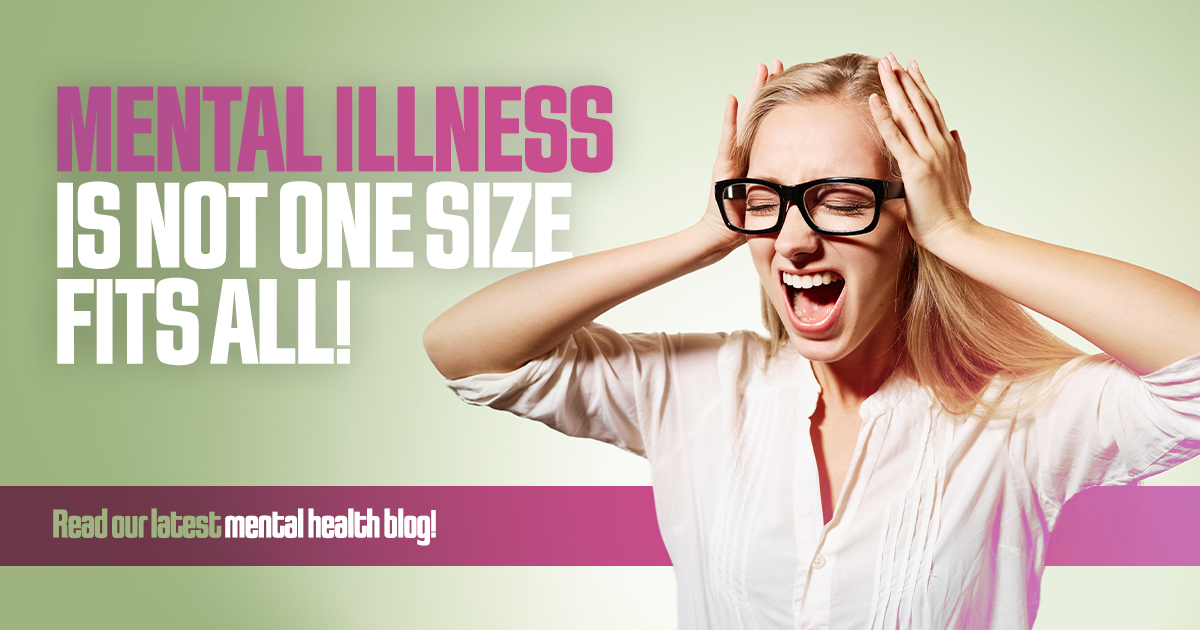The concept of mental health encompasses the wellbeing of your body, emotions, and social interactions. When your wellbeing is out of alignment, you can develop mental illness. Living with mental illness has its ups and downs. It doesn’t mean you have to “ride it out” or face it alone. Appropriate support resources and taking an active role in your treatment by recognizing the warning signs can mean all the difference in your quality of life and recovery.

1 in 5 adults will experience mental illness this year. There are many kinds of mental health disorders, each has a different impact on mood, behavior, and thinking. Factors that contribute to your mental health can be genetic, differing brain chemistry, or trauma and abuse. Below are a few examples of different mental health disorders:
- Mood Disorders
- Anxiety Disorders
- Behavioral Disorders
- Trauma and Stress-Related Disorders
- Psychotic Disorders
Red Flags

Everyone feels angry, sad, worried, and irrational at some point in their lives. Any concerning behavior you exhibit may be different than someone else, especially if there are different diagnoses. However, prolonged periods of these feelings or behavior that is interfering with your daily life can be a red flag.
These behaviors should be discussed with your doctor immediately to keep coping abilities within your control and make any needed changes to treatment. When you lose control of being able to cope, things can take a very serious and emergent turn. Other examples of warning signs are:
- Extreme Mood Changes
- Isolation from Family and Friends
- Alcohol or Drug Abuse
- Suicidal Thoughts
Taking Control of Your Mental Health
Once you know what your red flags are, you can begin to take control of your mental health. Treatment for mental illness comes in many forms and is not a “one size fits all” reality. Whether you decide on medical intervention or not, the first step is always to talk with your doctor and ensure you are sharing in the decision making about preferences and agreements on treatments. Medical interventions can be in the form of medication, mental health counseling, and others depending on diagnosis and severity.
Non-medical interventions include peer support where you connect with others in your community facing similar challenges. You also need to build a support system of people who are dependable, respect, you, and will not judge you when you need to lean on them. Even maintaining a positive attitude, exercising, and meditation are some simple ways to help improve your mental health. Lastly, if you have been diagnosed with a mental illness, educate yourself about it. This will provide valuable information on specific behaviors to watch out for and what treatments are more effective.
Clinical Research and Mental Health
Clinical research helps provide treatment options for those that are unable to receive current treatment options, current treatment options are ineffective, or are looking for a more streamlined treatment approach. As previously mentioned, there is not a blanket approach when it comes to treatment, so although there are many options available today to treat mental illnesses, effective treatment remains a dream for some. MyLocalStudy.com is a comprehensive website that matches you with studies in your area. All you need to search is your zip code!
You can find out more about the studies you are interested in and apply directly from the website. If you are interested in finding out more about our mental health studies, click HERE.
References:

